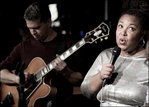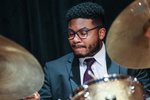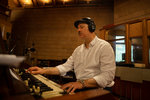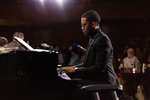




One Sunday morning in May, when summer was new and tulips were still policing empty sidewalks, I took a stroll in a leafy neighborhood of north Lansing.
To my left, from behind a two-story garage, a delicate blue thread of music spun into the treetops.
I turned left to see if I could locate the source. At the far end of a long driveway, a burly, bearded man sat on a tiny stool, garden spade in hand, staring down at five potted plants. In front of him was a patch of dirt and an empty trellis.
I couldn’t see a speaker, or the telltale glow of an iPhone, but the music was coming from his back porch. The tune was “Autumn Leaves,” which, despite its name, was the perfect track to play while gazing at black soil and envisioning the flowers to come in spring. That meant that the trumpeter was Miles Davis, playing a rare sideman gig with his friend, Julian “Cannonball” Adderley.
People call Miles Davis the Prince of Darkness. I don’t know about that. Miles at dawn on Sunday, threading through the trees and the rooftops of north Lansing, melding with the morning gold and the lingering dark, sounded like a second sun.
I didn’t say “Hello” or even make a sound. The man was totally absorbed in the task and the music, his back to me. As the shadows retreated another inch across the driveway, Miles handed the melody over to Adderley’s soulful saxophone.
I walked. The gardening man never saw me. A block away, I could still hear Cannonball’s juicy alto, low in the trees.
A lot of great sounds fill the summer air over Lansing. Cars throb with hip-hop until their fiberglass teeth rattle. Towering trucks pull classic-rock guitar riffs up and down Cedar Street. And there’s that lady on the motorcycle, Rose Cooper, singing her heart out on the road, a genre unto herself.
But in mid-summer, jazz — usually confined to bars, classrooms, coffee shops and other haunts — surprises us with a gracious, sun-soaked, open-air moment. This music is not meant to deaden, numb or obliterate the outside world. My morning walk with Miles left my soul dilated, receptive, harmonious.
In the next two weeks, two festivals, the Michigan Jazz Fest in Old Town and the east side’s Smooth Jazz Fete, will spin their blue threads into the summer sky. Here’s a preview of some of the artists scheduled to appear at Michigan JazzFest. We’ll preview the Smooth Jazz Fete next week.
Tiffany Gridiron:
A circle unbroken
8 p.m. Friday, Aug. 5
South Turner Stage
Listening to vocalist Tiffany Gridiron talk about one of her jazz idols, singer Sarah Vaughan, is like listening to astrophysicist Neil DeGrasse Tyson talk about Galileo. You feel the reverence, but you see the lineage.
“What Sarah does with a song is, she plays and bends and rephrases, using the great facility of her instrument,” Gridiron said.
With those words, she summed up her own artistry, except that Gridiron creates colors, moods and shadings no other singer can.
All her life, no matter what else intervened, she has circled back to song. Her first solo, sung from atop a chair at age 5, had naught to do with lollipops and gumdrops: “Were You There When They Crucified My Lord?”
Gridiron grew up in Los Angeles, where her family was deeply involved in the Church of God in Christ. Her dad was minister of music and led the choir.
“I don’t remember not singing,” she said.
Her grandmother, Jessie Richardson, was a singing evangelist of local cable TV renown who sang in churches and other venues all over Lansing for 50 years, including one of Mayor David Hollister’s inaugurations.
A dramatic turn led Gridiron to Lansing. After living in California for 25 years, her mother got a divorce and married a high school sweetheart from her old Lansing days.
“Now she’s living in her old family home, where Joe used to come pick her up on dates,” Gridiron said. “It’s kind of crazy.”
Gridiron moved to Lansing in her junior year and sampled musical theater at Sexton High School.
The jazz studies program hadn’t yet launched at MSU, and she had no interest in classical training.
“When I got into jazz, it was like I was creating my own education,” she said.
Three great jazz singers — Ella Fitzgerald, Billie Holiday and Sarah Vaughan — drew her special attention.
“If I can dive deeply into the rich tapestries of each one of these singers, I’ll have what I need to communicate what I want to say,” she explained.
While earning a degree in social science at MSU, she was unsure of what to do until she became involved in the Multi-racial Unity Living Experience, an undergraduate race relations-focused program that began when she was a freshman. Since then, she’s come full circle and now supports that program as a supervisor in MSU’s Office of Cultural and Academic Transition.
Gridiron said the program helps students coming to MSU deal with “a level of diversity folks have not experienced before,” offering opportunities for engagement and help developing a “skill set” for dealing with diversity.
“It’s very rewarding work,” she said. “The program blew me away.”
But there was still a gap in her life, until she heard vocalist Jill Scott’s 2000 debut album, “Who is Jill Scott? Words and Sounds, Vol. 1.”
“It was like something opened up in me,” Gridiron said. “There was something about that album — I could feel myself in her.”
She snagged a spot reserved for non-music-majors in MSU vocal music Professor Sunny Wilkinson’s class.
Within two months, she sang her first gig, at the now-defunct Lighter Side restaurant in Okemos.
After three years of substitute teaching in the daytime and hustling for vocal gigs at night, she took the bold step of moving to Tokyo to teach English and sing.
She met some local musicians. Within three months, she had her first gig. In another three months, she signed a contract with Sony that yielded five CDs. On the second CD, her accompanist was the legendary pianist Hank Jones, then in his 80s. Jones, who died in 2010, was one of the finest pianists in jazz history and Fitzgerald’s accompanist from 1948 to 1953.
“The experience was like being held, like a tender baby,” Gridiron said. “There was so much facility, and artistry and history and still such a joy to play the music.”
By then, Gridiron was completely in love with the canon of jazz standards.
“The vocalist is part of the band, and I love that,” she said. “And I love the interpretive quality of it. You can do the same song 20 times and never do it the same way.”
After returning to Lansing in 2011, she resumed her job at MSU and got a master’s in social work in 2019.
It took several years, but music again called out to her.
She sat in with drummer Jeff Shoup at Moriarty’s and East Lansing’s Summer Solstice Jazz Festival in 2019 and did her first gig in New York, at Smalls Jazz Club.
The pandemic enforced another pause, but in 2019, she wrote several original tunes for three planned CDs with trumpeter Kris Johnson, a multiple-Grammy-nominated trumpeter and MSU alumnus.
“This summer has been wonderful to be peeking my head out,” Gridiron said. At JazzFest Friday, she’ll be joined by Michael Malis, a Detroit-based musician with an experimental, wide-ranging musical mind, on keyboards, along with Ann Arbor bassist Joseph Deas and Detroit drummer Nate Winn.
They’ll throw out a bouquet of standards and a few of the originals Gridiron wrote for the project with Kris Johnson, including “From My Heart to Yours,” a moving memorial to her brother.
Brian Charette:
5 p.m. Saturday, Aug. 6,
River Stage
Prague or prog?
A great noise will deep-fry the air when New York jazzman Brian Charette, one of jazz’s top Hammond B-3 organists, joins guitarist Ralph Tope for a funky-and-beyond excursion into the organ-o-sphere.
Charette’s slithery, supple new CD, “Jackpot,” is debuting to great fanfare in the jazz world. It was recorded at one of the holiest shrines in jazz, recording engineer Rudy van Gelder’s home studio in New Jersey, where many of the music’s landmark recordings were waxed by Thelonious Monk, John Coltrane, Miles Davis and Wayne Shorter and on and on.
“It was incredible,” Charette said. “The lathe they used to cut the records is still there.” Maureen Sickler, Van Gelder’s longtime assistant, now does the engineering. Charette used an organ touched by some of the greatest jazz organists in history, including Jimmy Smith and Larry Young.
Was it intimidating to occupy such a sacred space?
“Music doesn’t intimidate me,” he deadpanned. “Just every single other thing.”
He called “Jackpot” his “most adult” album to date.
“A lot of my albums have electronics, wind ensemble — they’re not traditional,” he said. “This is a very traditional organ quartet record.”
Charette, 49, and Lansing’s own B-3 virtuoso, Jim Alfredson, met several years ago at a trade show (both of them are endorsed by the Hammond Co.), hit it off and ended up playing many gigs together with Detroit drummer Jordan Wright, especially at Moriarty’s.
“That’s how we came to fall in love with Lansing,” Charette said. He’s even got a collection of tiny chickens knitted by the fan lady in the front row at Moriarty’s.
The pandemic didn’t put much of a crimp in Charette’s career. He prides himself on saying no to nothing.
“If you play a keyboard instrument, you can communicate, and you get along pretty well with other people, there’s a lot of opportunities to do many different things,” he said.
He recently worked with country singer, composer and fiddler Amanda Shires. “She knocks me out,” he said. “I don’t work a lot in country music, but I find it very mysterious and beguiling.” He also writes “classical, legit stuff” that he plays with the Modern Arts Orchestra of Budapest. This summer, they’re working on an “alternate take” of Via Crucis, a late work by Franz Liszt for organ, with Charette on “distorted organ.”
“It’s very rock and roll, not what you would expect,” he said.
He’s been busy with recordings, movie scores, instructional videos, new jazz and electronic music, and he’s riding a “big boom” in students that started during the pandemic.
“Everybody was home and everybody was getting a check from the government,” he said.
All in all, Charette is grateful for his chosen line of work, on both the philosophical and practical levels.
“It’s obviously not easy, but I sleep very easy at night,” he said. “It’s not a lot of subterfuge. It’s very direct, somehow.”
Saturday’s JazzFest set is likely to be moderately adventurous.
“There will be jazz, for sure, but funky beats will dominate,” he said. “In a festival setting, it’s a little more of a party style — Lonnie Smith, Herbie Hancock. We also have a lot of synth, so we have this swirly electronica thing happening.”
I asked Charette if he planned to get into “prog,” or progressive rock, in the vein of Yes and King Crimson, thereby precipitating a fun misunderstanding.
“I used to live in Prague, and I have three Czech groups I play a lot with,” he offered.
I re-phrased the question.
“Oh, prog!” he cried. “I love prog rock too.”
However, being Brian Charette, he had stories ready for questions about both Prague and “prog.”
Several years ago, he was munching goodies at a trade convention mixer when he saw a rival hand reaching for the same piece of cheese.
The hand belonged to Keith Emerson, the multi-keyboardist legend from the trio of Emerson, Lake and Palmer, as close to a founding god of prog rock as they come. “We ended up playing together that night,” Charette said, adding the late artist was a “very nice man.”
Michael J. Reed:
4 p.m. Saturday, Aug. 6,
South Turner Stage
Take one concept
While many younger musicians cram their compositions with jostling ideas, drummer and composer Michael J. Reed’s music is as centered as a rock. The confidence and wisdom of his absorbing new CD, “Remove All Fear,” belie his brief 26 years on the planet.
“I like to keep the music digestible to the ear, and a little sneaky, so it keeps you coming back, wondering what’s coming next,” he said. “You can take one concept and expound on it, instead of putting three or four tunes into one.”
The title track of Reed’s absorbing new CD, “Remove All Fear,” distills that principle to a single note, a candle with a fragile yet unquenchable flame.
Reed knew the song was special, so he asked vocalist Rockelle Fortin to contribute lyrics and record the song on the album. She responded with a transcendent vocal performance that whispers like a comforting voice inside your mind.
“It’s for people who deal with anxiety and fear, the things like throws at us,” Reed said.
At JazzFest, Reed brings a quartet of Tim Blackmon Jr. on trumpet, Bijan Taghavi on piano and Lucas LaFave on bass.
Reed grew up in Toledo, bathed by marathon mornings of impassioned choral and instrumental music in the Baptist church. He still draws his musical inspiration from his deep religious faith, but gospel music demands a fine ear as well as deep feeling.
“Depending on how the holy spirit moves through the service, we might vamp on something for a while, and that developed my ear training,” he said.
The greatest drummers are listeners, and Reed is a consummate one.
“We drummers have a reputation of writing complex music, but it’s not about how much stuff you can put into a song,” he said. “It’s about what message you can convey, in manner that makes sense.”
As a youngster, he listened to records to figure out what the drummers were doing and played along.
“Growing up, music was always playing in the house — reggae, hip-hop, gospel, Motown, R&B,” he said. “Little did I know that was leading me into jazz.”
Legendary vocalist Jon Hendricks was still teaching at the University of Toledo when Reed was a freshman.
“I was just trying to soak it all in, be observant, rather than actively asking questions,” he said. “I get a little nervous, very shy. I’m naturally an introvert.”
Now Reed is listening to his own students, at MSU’s Community Music School-Detroit. This fall, he starts a new gig, as an adjunct professor at Saginaw Valley State University, teaching jazz combos and jazz history.
His only plan for now to “record and perform with as many people as possible.”
One of the stories running through this year’s JazzFest is the passing of another generational torch in jazz’s century-long relay run. The spiritual and musical weight of “Remove All Fear” hangs from the cable-tight rhythm section of Reed, pianist Luther Allison and the teacher of all teachers, bassist and MSU jazz studies Director Rodney Whitaker.
“Rodney makes it easy to gel together,” Reed said. “He’s like the glue. To have him as a mentor, and have him hire me in his band, show me the things he’s learned with all the people he’s played with — it just felt right.”
This year’s JazzFest features a slew of musicians who, like Reed, came up through the MSU program and are dispersing around the world, re-greening the music, upholding its traditions while taking it in new directions.
Reed recalled with a laugh that when he recorded “Remove All Fear,” Whitaker was planning an album of his own, with the same personnel.
“He said, ‘Man, you took my band,’” Reed said. His pride in the moment gave way to humility: “Not sure you want to use that in the article.”
Luther S. Allison:
9:30 p.m. Thursday, Aug. 4,
UrbanBeat, 1213 Turner St.
Hometown heroes
When many young jazz musicians are asked who influenced them most, they’ll tick off the names of icons like John Coltrane, Duke Ellington or Thelonious Monk.
Pianist Luther S. Allison’s answer to the question points to the hidden riches of local music scenes across the United States, including Charlotte, North Carolina, where Allison grew up.
“For me, it was all about home town heroes,” Allison said. “I went through a big Lovell Bradford phase.” Lovell who? Better get wise if you ever visit the Queen City. Bradford is a fixture of the Charlotte jazz scene, as pianist, drummer and educator. Take in a few minutes of Bradford’s music on YouTube, energized in the manner of McCoy Tyner, and you can see why Allison is already near the top of the art.
“I would see him at different shows, record his solos and go home and learn some of the stuff he would play,” Allison said.
When Allison was in high school, another hometown hero, drummer Ocie Davis and his wife, Lonnie, started up a successful nonprofit, JazzArts Initiative. Allison and many other local musicians got their first gigs through the program, now called JazzArts Charlotte.
Allison, 26, went to the University of Tennessee at age 17 and soaked up the wide-ranging experience of another hometown hero, pianist Donald Brown.
His time with Brown drew him, in turn, into the rich piano heritage of the Memphis Mafia, a distinguished constellation of pianists that includes Mulgrew Miller, Harold Mabern and James Williams. That’s a lot of name-dropping, but can I help it if Memphis is so rich in musical history? Each of these artists has a unique and compelling piano “voice,” they all deserve wider renown, and they all feed into Allison’s fascinating and unique piano style.
It wasn’t until Allison’s time at MSU that he stretched beyond his hometown heroes into the bebop lineage of Thelonious Monk and Bud Powell. Lately, he’s been hearkening to early jazz pioneers like Art Tatum, Eubie Blake and Jelly Roll Morton.
“That’s the way-way-back,” he said. “It’s funny, but as I’m living longer, I’m checking out older and older stuff.”
It all finds its way into Allison’s sparkling and urbane yet deeply grounded piano style, alert to every nuance of the moment.
Allison made a connection with MSU trombone professor Michael Dease at the Brevard Music Center, where Dease runs a summer music camp.
He was gravitating toward New York, but Dease nudged him to consider MSU.
He said it’s been the best educational experience of his life, but he was unsure at first about moving to Lansing.
“It’s the capital, but it’s even smaller than Knoxville,” he marveled. But the state’s rich jazz life has kept him busy with gigs from Detroit to Kalamazoo, Ann Arbor, Detroit, Grand Rapids and beyond.
At MSU, he found the faculty not only to be world-class jazz artists, but also educators with a purview stretching far beyond music.
“They want you to understand the implications of the music and the world at large, the government, even race issues,” he said.
At JazzFest, Allison will be joined by Michael J. Reed on drums and MSU bass student Jonathan Müir-Cotton.
He’ll take his New York trio, with MSU grad (and “Late Show with Stephen Colbert” house bassist) Endea Owens and drummer Charles Gould, to his old stomping grounds of Charlotte and environs for a tour this fall.
Support City Pulse - Donate Today!
Comments
No comments on this item Please log in to comment by clicking here